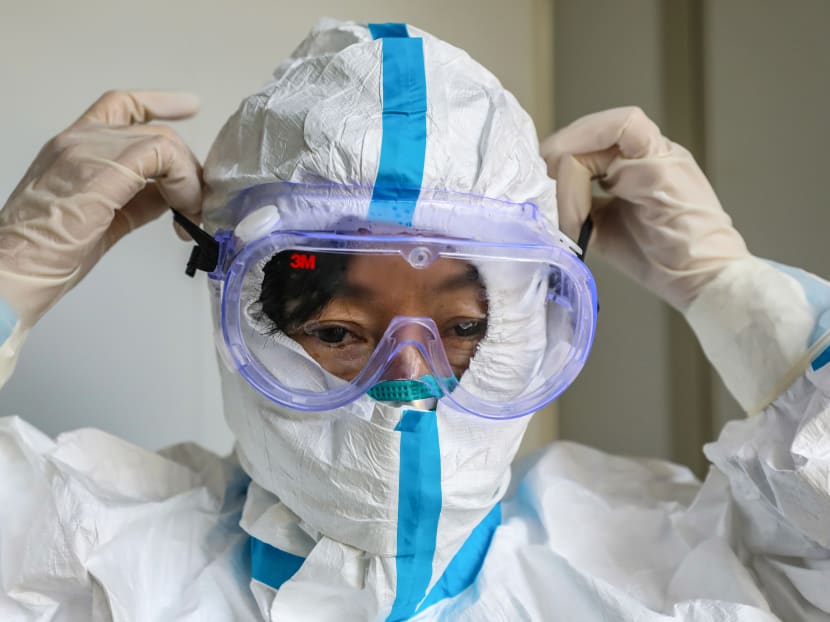Wuhan doctors beaten up, overworked, under supplied
HONG KONG — Doctors and nurses in Wuhan are risking their lives in more ways than one.

A doctor puts on a pair of protective glasses before entering the isolation ward at a hospital in Wuhan in China's central Hubei province, Jan 30, 2020.
HONG KONG — Doctors and nurses in Wuhan are risking their lives in more ways than one.
China has taken unprecedented steps to fight the deadly coronavirus outbreak that started in the central China city, including locking down a province of 60 million people, but on the front line of the battle in hospital wards, doctors and nurses say they lack basic supplies and face physical threats from panicking patients.
One doctor at a Wuhan hospital said he had not been home for two weeks and even during a recent midnight shift he had 150 patients lined up at the outpatient clinic.
“All patients are anxious. Some became desperate after waiting for hours in the cold,” he said.
“I heard one in the queue say he had waited for so long that he wanted to stab us. I am worried. Killing a few of us will not reduce the queue, right?”

His concerns about violence are understandable. On Wednesday (Jan 29), two doctors at Wuhan Fourth Hospital were beaten up by a family member of a patient with pneumonia caused by the virus. One of the doctor’s protective clothing was ripped in the infected zone, Beijing Youth Daily reported.
“Emotions are running high as the hospital has been running at maximum capacity since early January. Many cannot find a bed. But what can we do?” said the doctor, who requested his name not be published as he is not authorised to speak on the matter.
“Doctors and nurses are working non-stop, even the midnight shift is totally full. We are surrounded by patients coughing next to us all night long.”
As of Friday, more than 9,600 people in mainland China had been confirmed as being infected with the virus, with 213 deaths. The number of infections has surpassed the total reported in the severe acute respiratory syndrome epidemic of 2002-03.
The World Health Organization on Thursday declared the outbreak in China a global public health emergency, citing the potential of the virus to spread to countries lacking the capabilities to deal with it.
Beijing said it had mobilised more than 6,000 medical personnel to help exhausted colleagues in Hubei province, of which Wuhan is the capital. China’s army, navy and air force have also sent doctors to reinforce the three main hospitals treating patients in the city.
But even after 500,000 medical staff in Hubei cancelled their Lunar New Year holidays over the past week, as 60 per cent of China’s confirmed infections and 95 per cent of the deaths from the virus have been in Hubei, hospitals are reaching breaking point.
Army doctors were providing important backup, but hospitals were still short-staffed, said a person familiar with the operation.
“Too many patients need to be treated, too many tests need to be done, everybody is busy. But with our team in there, at least the Wuhan comrades can have one or two more hours’ sleep,” the person said on condition of anonymity.
Xinhua reported earlier that teams from the Army Medical University in Chongqing were treating more than 72 patients confirmed as being infected with the coronavirus at Jinyintan Hospital in Wuhan.
Other medical workers in the city said the supply of essential gear had improved but was still far from sufficient.
A doctor at Tongji Hospital, who asked not to be named, said he had worn the same protective clothing for a 10-hour shift, because of the shortages.
“The gear needs to be changed every time we come out of an [infected] zone,” he said.
“I wear adult diapers and try to drink less water during the shift, so that I don’t have to go to the washroom. This is common among my colleagues.”
Wuhan’s official newspaper Yangtze Daily reported on Sunday that the city had received 10,000 packs of protective clothing, 800,000 N95 respiration masks, 5 million disposable masks and 4,200 pairs of goggles.
“The supplies were basically adequate. The shortage has been alleviated,” the report said.
But the Tongji Hospital doctor said there was also an issue with the quality of the equipment being supplied.
“We’ve learned from experience that some low quality equipment just breaks,” he said. “I’m not sure who bought those for the hospital, as they could lead to the deaths of doctors and nurses.”
On Thursday, a doctor from the neurosurgery unit at Wuhan Union Hospital said on Weibo — China’s Twitter-like platform — that the hospital was in desperate need of medical supplies, including goggles, single-use protective suits and N95 respirator masks.
“Our supplies are nearly all used up! Please forward this, sorry for always disturbing everyone!”
The post also included an appeal for financial donations, and included bank account details and the phone numbers of the hospital employees people should contact.
One of the contacts, a man surnamed Cheng, said single-use protective suits were most in demand.
“Without protective suits, doctors cannot come into contact with patients or treat them at all, so it’s greatly affecting our work,” he said.
“We go through a huge number of these suits a day. We initially received a lot of public donations after our first request for help, but we found that many of them didn’t fit medical guidelines and could not be used.”
Cheng said that the doctors at Wuhan Union Hospital were coping despite the huge strain on resources.
“After all, our job is to serve society,” he said, adding that he too had been working 15- and 16-hour days.
Several videos of overworked Wuhan doctors having emotional breakdowns have been shared on social media in recent days.
Another doctor said he and his colleagues had discovered that management and administration staff had taken more face masks from the hospital’s supplies than they had.
“I’m angry. The frontline is short of supplies but the bosses are taking so many of them. Shouldn’t we be given a higher priority?” he said.
“The bosses inspecting our hospital are wearing top notch N95 masks, while frontline doctors and nurses only have the regular ones. What else can I say?” SOUTH CHINA MORNING POST






